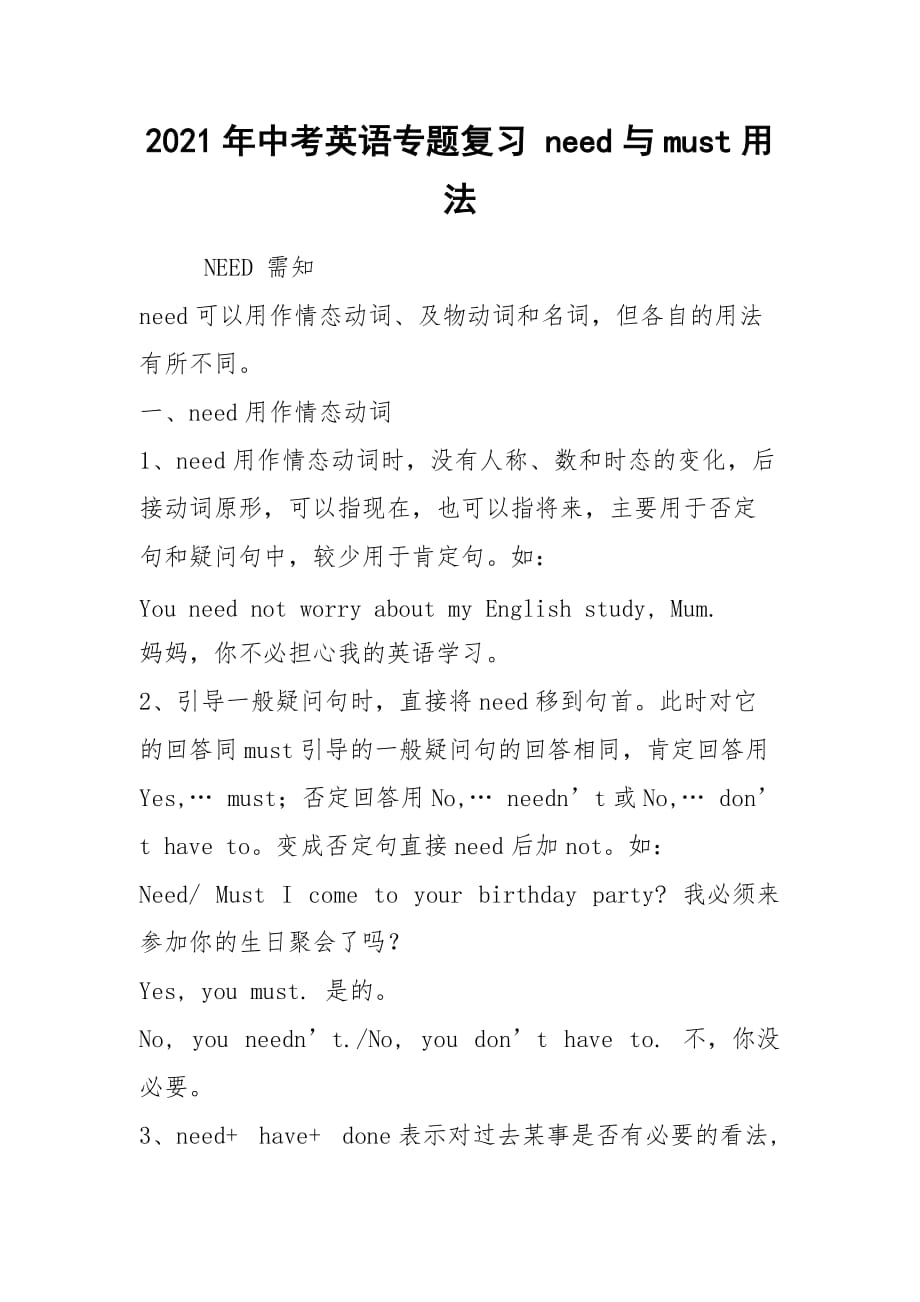《2021年中考英語(yǔ)專題復(fù)習(xí) need與must用法》由會(huì)員分享�,可在線閱讀,更多相關(guān)《2021年中考英語(yǔ)專題復(fù)習(xí) need與must用法(7頁(yè)珍藏版)》請(qǐng)?jiān)谘b配圖網(wǎng)上搜索�����。
1、2021年中考英語(yǔ)專題復(fù)習(xí) need與must用法
NEED 需知
need可以用作情態(tài)動(dòng)詞����、及物動(dòng)詞和名詞,但各自的用法有所不同����。
一、need用作情態(tài)動(dòng)詞
1�����、need用作情態(tài)動(dòng)詞時(shí)�,沒有人稱、數(shù)和時(shí)態(tài)的變化�����,后接動(dòng)詞原形����,可以指現(xiàn)在,也可以指將來(lái)�,主要用于否定句和疑問(wèn)句中,較少用于肯定句。如:
You need not worry about my English study, Mum.
媽媽�����,你不必?fù)?dān)心我的英語(yǔ)學(xué)習(xí)����。
2、引導(dǎo)一般疑問(wèn)句時(shí)����,直接將need移到句首。此時(shí)對(duì)它的回答同must引導(dǎo)的一般疑問(wèn)句的回答相同����,肯定回答用Yes,… must�;否定回答用No,… nee
2、dn’t或No,… don’t have to�����。變成否定句直接need后加not�����。如:
Need/ Must I come to your birthday party? 我必須來(lái)參加你的生日聚會(huì)了嗎?
Yes, you must. 是的����。
No, you needn’t./No, you don’t have to. 不,你沒必要����。
3、need+ have+ done表示對(duì)過(guò)去某事是否有必要的看法,常含有責(zé)備之意�����。如:
You needn’t have told him the secrets between us.
你沒有必要告訴他你我之間的秘密�����。
4����、need用作情態(tài)動(dòng)詞
3、可以和否定副詞:hardly, never, seldom等連用�����,表示實(shí)際的否定����。如:
I need hardly tell you how sad I feel about my fault.
我不必告訴你我對(duì)我的過(guò)錯(cuò)有多么難過(guò)����。
二�、need用作及物動(dòng)詞
1、need用作及物動(dòng)詞時(shí)����,有人稱、數(shù)和時(shí)態(tài)的變化(主語(yǔ)第三人稱單數(shù)用needs�����,過(guò)去式用needed)�,后接名詞、代詞或動(dòng)詞不定式(表示主動(dòng)意義)�����,往往用于肯定句和否定句中�。如:We all need some help.
我們都需要一些幫助�����。
It’s cold outside. You need to wear a wa
4、rm coat.
外面天冷�。你得穿暖和的衣服。
2�����、引導(dǎo)一般疑問(wèn)句時(shí)����,必須借助助動(dòng)詞do, did或does。變成否定句時(shí)亦如此�����。如:
Did Millie need any money to buy gifts for her mother? Millie需要一些錢來(lái)幫她媽媽買禮物嗎/ Yes, she did. 是的�,需要。
No, she didn’t. 不�,不需要。
I don’t need things like that.
我不需要像那樣的動(dòng)詞�。
3、后接動(dòng)名詞時(shí)表示被動(dòng)的含義,相當(dāng)于不定式的被動(dòng)語(yǔ)態(tài)�,但此時(shí)的主語(yǔ)須是物,即:物+ need +doing=物+ nee
5�����、d+ to be done。如:
My hair needs cutting.= My hair needs to be cut.
我需要理發(fā)了�。
三、need用作名詞
1�、need用作名詞時(shí),意為“需要�、必要”,既可用作可數(shù)名詞也可用作不可數(shù)名詞����。如:
We should try our best to meet the workers’ needs.
我們應(yīng)該盡力滿足工人們的需要。
2����、There is no need+ for somebody of doing something/to do something.意為“對(duì)某人來(lái)說(shuō)沒必要做某事”,此時(shí)可以轉(zhuǎn)換成Somebod
6�����、y doesn’t need to do something�����。如:
There is no need for us to worry about our study.
=We don’t need to worry about our study.
我們沒必要擔(dān)心我們的學(xué)習(xí)����。
3、常見短語(yǔ):be in need of in need
I’ll come to help you when you are in need of help.
在你需要幫助的時(shí)候我會(huì)來(lái)幫你的����。
A friend in need is a friend indeed.
患難見真情。
must中考焦點(diǎn)訪談
7����、
【焦點(diǎn)1】Cars, buses and bikes stop when the traffic light is red.
A. can
B. must
C. may
D. need
【訪談】must表示主觀的義務(wù)和必要, 主要用于肯定句和疑問(wèn)句, 意思為“必須……,得……,要……”。故本題應(yīng)選B�����。
【焦點(diǎn)2】--- I fill in the check-in form right now, sir?
----No, you needn’t. You can complete it this afternoon.
A. May
B. Can
C. Would
D.
8�、 Must
----Mum, must I do my homework now?
----No, you . You can do it after supper.
A. mustn’t
B. can’t
C. shouldn’t
D. needn’t
【訪談】回答must引導(dǎo)的一般疑問(wèn)句時(shí),與need引導(dǎo)的一般疑問(wèn)句回答一樣�����,肯定回答用:Yes, 主語(yǔ)+must;否定回答用:No,主語(yǔ)+needn’t /don’t have to����。故這兩題都應(yīng)選D。
【焦點(diǎn)3】Alice has been in China for several years. She be a big g
9�����、irl now.
A. need
B. must
C. can
D. may
Mary be at home. I saw her in the library just now.
A. mustn’t
B. needn’t
C. shouldn’t
D. can’t
【訪談】must用于肯定句,表示可能性很大的猜測(cè)�、推測(cè),意為“一定����、必定或想必”,后面接動(dòng)詞的一般時(shí)�,表示對(duì)現(xiàn)在的推測(cè),接動(dòng)詞的完成式�,表示對(duì)過(guò)去的推測(cè)。若變?yōu)榉穸ň鋾r(shí)�,須將must 改為can’t,意為“不可能”�����。故這兩題應(yīng)分別選B和D�����。
【焦點(diǎn)4】You open the door before the
10�、 train gets into the station.
A. don’t have to
B. mustn’t
C. needn’t
D. may not
【訪談】must的否定形式mustn’t表示“禁止、杜絕�、絕對(duì)不許做(某事)”,意為“不能”����,加強(qiáng)語(yǔ)氣用must never。故本題應(yīng)選B�。
【焦點(diǎn)5】The woman must be your English teacher, she?
A. mustn’t
B. needn’t
C. isn’t
D. can’t
My father must have finished reading the novel yesterday, he?
A. needn’t
B. can’t
C. wasn’t
D. didn’t
【訪談】must表示“推測(cè)”用于反意疑問(wèn)句時(shí),不能用must����,而要根據(jù)陳述部分的不定式結(jié)構(gòu)(即must之后的動(dòng)詞)以及含義采用相應(yīng)的動(dòng)詞形式。如有表示過(guò)去的時(shí)間狀語(yǔ)�����,則
反意疑問(wèn)句部分的助動(dòng)詞用過(guò)去時(shí)�����;如沒有表示過(guò)去的時(shí)間狀語(yǔ)�����,則反意疑問(wèn)句部分的助動(dòng)詞要根據(jù)實(shí)際情況而定�����。故這兩題應(yīng)分別選C和D����。
 2021年中考英語(yǔ)專題復(fù)習(xí) need與must用法
2021年中考英語(yǔ)專題復(fù)習(xí) need與must用法

